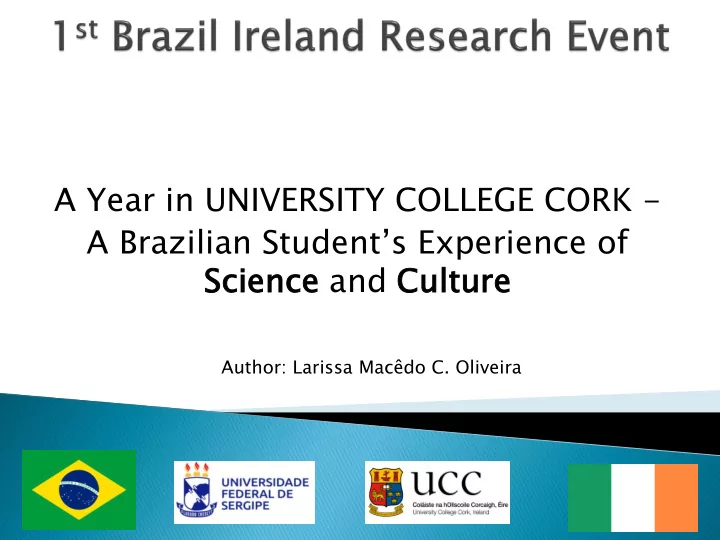

A Year in UNIVERSITY COLLEGE CORK - A Brazilian Student’s Experience of Science ience and Culture lture Author: Larissa Macêdo C. Oliveira /
A life changing experience; What’s the craic?
Ireland and Brazil share a number of similarities; Get the chance to see the best from both worlds.
Opportunity to see different approaches in Geology: • Theoretical vs. Practical
Interaction with lecturers and classmates: • Exchanging skills
Why to study Hydrogeology?
The Amazon River basin contains roughly 50 % of the country’s water, but only 4 % of its population . ➢ About 80% of Brazil’s population is concentrated in the East coast ➢ While less than 10% of the Water resources is concentrated on the Northeast and Southeast Source: World Resource Institute
Northeast Drought crisis ‣ Over 10 million people live under geoclimatical conditions and lack of access to fresh water in the Northeast
Ranked 19 th in Environmental Performance Index Environmental Performance Abundant water resources It has a well established Water Protection Policy and Programme The concepts learnt in Ireland can be used in the improvement of water management in Brazil and the world
Important because: • It has unique features; • One of the few confined aquifers in Ireland; • Radon contamination hypothesis;
Study Area Radon Map of Ireland High Radon Area – More than 20% of the houses are estimated to be above the Reference Level Source: Environmental Protection Agency
• Data collection from: • Analysis of Hydrogeologycal features such as: -Structural geology; -Aquifer Units -Aquitard Units -Recharge zones; -Discharge zones -Flow Paths -Water Levels -Hydrochemistry; -Other
Analyse the Aquifer classifications: • Calcareous Aquifer – WHY? • Regionally important fractured aquifer – WHY? • Understand the recharge zone patterns (Where the water comes from?) • Understand the hydrochemistry flow – Water type changes along the flow paths
Partial Results
What I have gained from the research experience: ◦ Development of professional and research skills; Improvement of data collection and data analysis skills Research management plans – Know how to plan the future steps Software usage – ArcGis, advanced Excel Self-confidence as a student
Future steps Continue the research as Final Graduation Project Collect more data: ◦ New data on wells and boreholes ◦ Run geophysical survey ◦ Create a 3D model fot the Kiltorcan Sandstone Aquifer Provide guidance for future aquifer management plans around the world
Possible Highlights: ◦ 1st partnership between the Universidade Federal de Sergipe and University College Cork ◦ To strenghten future links between Brazilian and Irish universities ◦ To inspire students to prospect future international research projects
Thank you!
Recommend
More recommend